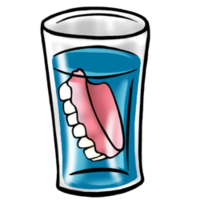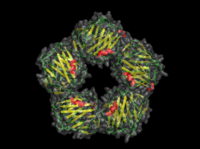Oral Health and Pointless Tests

I really like the Fox News Channel, but I sometimes worry about some of the medical advice that they dish out. The other morning I heard a dentist recommend that people should ask for a blood test to measure inflammation. She was saying that everyone should have the test, called C-Reactive Protein (CRP). This is really bad advice that is based on a fundamental misunderstanding of research data.
Yes, there is a link between dental disease and arteriosclerosis. And yes, there is a link between CRP and arteriosclerosis. But there is no good evidence that we should be measuring it on a routing basis.

The CRP Molecule
So what’s the problem about measuring CRP? If it is elevated, then what? There is no point in measuring anything at all unless you can take some action, or it guides prognosis. No good doctor would ever recommend treating a lab value. So if the CRP is elevated that would not just mean that it’s time to have a look at his or her pearly whites, it would mean a total body workup. There are dozens of causes for an elevated CRP. I know a lot about the topic: sixteen years ago I wrote one of the early scientific papers on CRP. It may go up if you have a fat tummy, have arthritis, allergies or if you are depressed, have fibromyalgia or irritable bowel syndrome. It also goes up as you get older, if you are physically inactive, or if you happen to have one of the genetic variants that can push it up.
In fact the questions of whether or not measuring CRP would improve coronary risk prediction is the subject of three papers and two editorials in the July 10, 2006 issue of the Archives of Internal Medicine and the July 4, 2006 issue of the Annals of Internal Medicine. In the July 10, 2006 issue of the Archives of Internal Medicine, a team led by Dr Aaron R. Folsom from the University of Minnesota in Minneapolis reported the results of the Atherosclerosis Risk in Communities (ARIC) study, which assessed the association of 19 novel risk markers with incident CHD in 15 792 adults followed up since 1987-1989.
The participants underwent a physical examination, including assessment of major risk factors, at the beginning of the study and every three years afterward. At four times during the follow-up period, researchers collected blood and DNA samples for analysis. Patients continue to be tracked for the development of CHD. Novel markers included measures of inflammation, endothelial function, fibrin formation, fibrinolysis, B vitamins, and antibodies to infectious agents.
Folsom concluded that:
“C-reactive protein level does not emerge as a clinically useful addition to basic risk-factor assessment for identifying patients at risk of a first CHD event. Routine screening is not warranted for any of the other 18 novel risk factors tested, either.”
Another study from Brigham and Women’s Hospital in Boston did suggest that CRP might be helpful in predicting coronary disease in some women. But in an editorial, George Davey Smith from the University of Bristol in England had this to say:
“There are many reasons for skepticism about the role of CRP as a predictor of CHD: CRP may not be causally related to CHD; it remains more expensive than asking patients about their health, lifestyle, and socioeconomic background; and it adds only modest additional predictive ability over conventional risk factors, even in Cook and colleagues’ (i.e. the Brigham and Women’s) study.”
The moral of the story? Random measurements of CRP have not been shown to be of much value.
And be a bit cautious about medical advice on Fox News.






